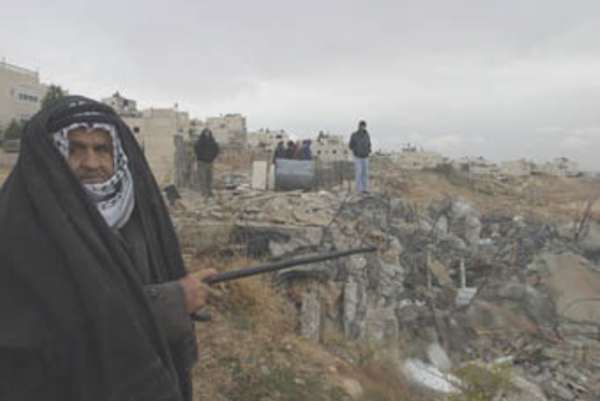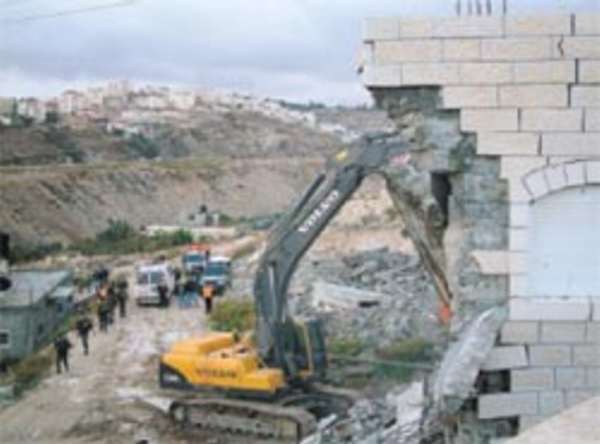
DECEMBER 2005

Secret EU report launches scathing attack on Israel
By Donald Macintyre in Jerusalem
Published: 25 November 2005
European governments should consider direct intervention in an attempt to curb the systematic measures being undertaken by Israel to increase its control and population in the historically - and legally - Arab eastern sector of Jerusalem, a highly sensitive EU report concludes.
The confidential report, prepared by top diplomats representing the 25 EU governments in the city, warns that the chances of a two-state solution are being eroded by Israel's "deliberate policy" - in breach of international of law - of "completing the annexation of East Jerusalem".
European Foreign Ministers this week vetoed planned publication of the report - which also warns that rapid expansion of Jewish settlements in and around East Jerusalem, along with use of the separation barrier to isolate East Jerusalem from the West Bank, "risk radicalising the hitherto relatively quiescent Palestinian population of East Jerusalem".
The report provides the most detailed and remorselessly critical account yet produced by a Western international body of Israel's policy in East Jerusalem, which has been occupied since its seizure in the 1967 Six Day War. It points out that Jerusalem "is already one of the trickiest issues" on the road to a final peace deal between Israel and the Palestinians. It adds that, as a result of the measures, "prospects for a two state solution with East Jerusalem as the capital of Palestine are receding".
Among the recommendations in the report, drafted in October during the British EU presidency which ends next month, the EU is urged to consider a series of steps including direct support for projects that help Palestinians to conduct legal battles against house demolitions, which it points out tripled in the city during 2004, and the persistent refusal to grant building permits to all but a small minority of Palestinians. The report also suggests holding meetings with the Palestinian leadership in East Jerusalem, presumably to demonstrate that - contrary to the Israeli government's goal of Jerusalem as its "undivided capital" - it sees East Jerusalem as the future capital of a Palestinian state.
The EU foreign ministers' meeting was widely reported in Israel to have decided against publication of the report in its present form because of the risk to its relationship with the Jewish state especially when for the first time Israel has given its blessing to the EU having a key security role in the region by monitoring the Rafah crossing point from Gaza into Egypt. The EU will be represented at senior level at a ceremonial opening of the crossing by the Palestinian President Mahmoud Abbas today.
The 11-page report, leaked to The Independent, says the E1 project for a major expansion of Ma'ale Adumim, the largest Israeli West Bank settlement, to join it to Jerusalem "threatens to complete the encircling of the city by Jewish settlements, dividing the West Bank into two separate geographical areas." It says that, while the present 30,000 residents of the settlement at present occupy only 15 per cent of the planned area, the total plan envisages an area of 53 square miles - "larger than Tel Aviv" - extending through the West Bank between Jerusalem and Jericho.
While the plans will divide the West Bank from itself and from East Jerusalem, the report says "the economic prospects of the West Bank[which has a GDP per year per head of $1,000] are highly dependent on access to East Jerusalem [GDP of $3,500]. It adds: "From an economic perspective, the viability of a Palestinian state depends to a great extent on the preservation of organic links between East Jerusalem, Ramallah and Bethlehem".
The document says when the separation barrier is completed, Israel will "control all access to and from East Jerusalem, cutting off its Palestinian satellite cities of Bethlehem and Ramallah, and the rest of the West Bank beyond. This will have serious economic, social and humanitarian consequences for the Palestinians. By vigorously applying policies on residency and ID status, Israel will be able finally to complete the isolation of East Jerusalem - the political commercial and infrastructural centre of Palestinian life."
It adds: "Israel's activities in Jerusalem are in violation of both its Roadmap obligations and international law. We and others in the international community have made our concerns clear on numerous occasions with varying effect. Palestinians are, without exception, deeply alarmed about East Jerusalem. They fear that Israel will 'get away with it' under cover of disengagement [from Gaza]." The document says smaller Jewish settlements inside Palestinian areas are sometimes installed by would-be settlers "preying on Palestinians suffering financial hardship or simply [occupying] properties by force".
Besides suggesting that a formal call by the EU and the US-led international quarter on Israel to stop prejudicing final status negotiations by its actions in East Jerusalem would be "timely", one proposal is for the EU to consider "excluding East Jerusalem from certain EU/Israel joint co-operation activities." While the document does not say so, this could realistically mean halting European funding for road, rail and projects which contribute to the process of annexation.
The reports says the purpose of keeping West Bank ID holders out of East Jerusalem and East Jerusalem ID holders out of the West Bank "is almost certainly demographic , to reduce the Palestinian population of Jerusalem while exerting efforts to boost the number of Israelis living in the city - East and West."
http://news.independent.co.uk/world/middle_east/article329199.ece

A Palestinian elderly man pointing to the site of his
home, which was demolished by Israeli occupation forces
in Annata, occupied Jerusalem, yesterday,
November 25, 2005
Europeans Rebuke Israeli Jerusalem Policy
JERUSALEM, Nov. 24 - The European Union's diplomatic representatives in East Jerusalem and Ramallah have sharply criticized Israel's policies in East Jerusalem, saying they "are reducing the possibility of reaching a final-status agreement on Jerusalem that any Palestinian could accept."
In an unpublished report presented to European Union foreign ministers, the representatives recommend a more aggressive European stance toward Israeli policies in East Jerusalem, whose annexation by Israel has not been recognized by the European Union or the United States.
The report, a copy of which was sought by The New York Times and obtained from someone who wanted to publicize it, accuses Israel of increasing illegal settlement activity in and around East Jerusalem and of using the route of its separation barrier "to seal off most of East Jerusalem, with its 230,000 Palestinian residents, from the West Bank" and to create a "de facto annexation of Palestinian land."
In general, the report asserts, "prospects for a two-state solution with East Jerusalem as the capital of Palestine are receding," and it warns that "Israeli measures also risk radicalizing the hitherto relatively quiescent Palestinian population of East Jerusalem."
The European Union diplomats, who deal with the Palestinians, made a number of recommendations, including having political meetings with Palestinian Authority ministers in East Jerusalem instead of in the West Bank, as they currently do, and requesting Israel "to halt discriminatory treatment of Palestinians in East Jerusalem, especially concerning working permits, building permits, house demolitions, taxation and expenditure."
Last Monday in Brussels, European Union foreign ministers issued a statement expressing "grave concern" about Israeli policies "in and around East Jerusalem, including construction of the separation barrier, settlement building and house demolitions."
But the ministers decided not to release or acknowledge the report at a delicate time in European-Israeli relations, instead asking for a "detailed E.U. analysis on East Jerusalem to be adopted and made public" at their next meeting in mid-December. European countries, as well as the United States, keep embassies to Israel in Tel Aviv, while maintaining consulates in East Jerusalem and Ramallah to deal with the Palestinians.
Marc Otte, the European Union's special representative to the Middle East peace process, played down the report, saying that it was a routine response to a request to keep foreign ministers apprised of trends in East Jerusalem. The ministers also request and receive reports about Kosovo and Iran, he said.
"There was no report on the table," Mr. Otte said in an interview. "There's nothing exceptional or extraordinary about it. It's not like ministers of foreign affairs lie awake at night thinking about a report on East Jerusalem. They get lots of reports."
Mr. Otte emphasized that with the European Union plan to put observers in Gaza to monitor the Rafah crossing between Egypt and Gaza - starting on Saturday - the European Union "is actively involved in helping disengagement with people on the ground and a lot of money."
The Europeans know that most Israelis regard them as pro-Palestinian, an attitude that the East Jerusalem report is bound to reinforce. But Mr. Otte said that the Europeans had serious criticism of the Palestinians, too, especially on the topic of security and terrorism.
Europe is committed to the document known as the road map as the only path toward peace, he said.
"There is no European crusade here," he said. "Our relations with Israel are very improved, more operational and pragmatic. But it's our obligation as a member of the quartet to monitor events on the ground." Israeli officials would only speak anonymously because they had not seen the report and it is still an internal European Union document.
"The foreign ministers decided not to publish the report and not to act on it now," a senior Israeli Foreign Ministry official said. "Officially, it's an egg not born yet, and our assessment is that with the Israeli election campaign starting this week and the good moment of European involvement in Rafah, the Europeans decided that this is not the right moment to open up Jerusalem as an issue."
The official acknowledged that Israel and Europe disagreed about the legal status of East Jerusalem and of Jewish settlements within it.
Israel does not regard the Jewish inhabitants of East Jerusalem as settlers. Israel seized East Jerusalem from Jordan in the 1967 Arab-Israeli war and later annexed it, promising that the city would never again be divided. Both the Europeans and the United States oppose any measures that would prejudge the outcome of a peace treaty, including the status of East Jerusalem.
"We claim full sovereignty over Jerusalem, and the Europeans think East Jerusalem is occupied territory," the official said. "But to say that the timing is wrong is an understatement. My guess is that it will be put aside."
What exercises Israeli officials is the suggestion that European diplomats and ministers renew contacts with Palestinian Authority ministers in East Jerusalem, and not in Ramallah. In the past, European envoys met Palestinian politicians at the Orient House in East Jerusalem, but after a terrorist attack in 2001, Israel shut down all Palestinian Authority institutions in East Jerusalem.
The first stage of the dormant road map calls for these Palestinian institutions to be reopened. But Israel remains strongly opposed to the idea.
The report says that Israel is making it increasingly difficult for Palestinians to travel between East Jerusalem and the West Bank. "Israel's main motivation," the report asserts, "is almost certainly demographic - to reduce the Palestinian population of Jerusalem, while exerting efforts to boost the number of Jewish Israelis living in the city."
The report is particularly explicit about what it terms "increasing settlement activity" in three areas in and around East Jerusalem.
The first area is formed by new Jewish neighborhoods in the Old City and in the surrounding Palestinian neighborhoods, including Silwan, Ras al-Amud, Wadi al-Joz and Sheik Jarrah. The second is in existing East Jerusalem neighborhoods running from Ramot and French Hill through the new Israeli neighborhoods to East Talpiot, Har Homa and Gilo. And the third is in "greater Jerusalem," which links the city to the settlement blocs of Givat Ze'ev to the north, Maale Adumim to the east and Gush Etzion to the south.
The Israeli prime minister, Ariel Sharon, says the larger settlement blocs will remain a part of Israel in any final settlement.

An Israeli
occupation bulldozer demolishing a Palestinian house
belonging to Khaled Muhammed in Jerusalem, (Alquds,
Secret British document accuses Israel
FO paper says international laws are being violated and peace jeopardised
Chris
McGreal in Jerusalem
Friday November 25, 2005
Guardian
A confidential Foreign Office document accuses Israel of rushing to annex the Arab area of Jerusalem, using illegal Jewish settlement construction and the vast West Bank barrier, in a move to prevent it becoming a Palestinian capital.
In an unusually frank insight into British assessments of Israeli intentions, the document says that Ariel Sharon's government is jeopardising the prospect of a peace agreement by trying to put the future of Arab East Jerusalem beyond negotiation and risks driving Palestinians living in the city into radical groups. The document, obtained by the Guardian, was presented to an EU council of ministers meeting chaired by the foreign secretary, Jack Straw, on Monday with recommendations to counter the Israeli policy, including recognition of Palestinian political activities in East Jerusalem.
But the council put the issue on hold until next month under pressure from Italy, according to sources, which Israel considers its most reliable EU ally.
Israel has described a recommendation for moving EU meetings with the Palestinian Authority from Ramallah to East Jerusalem in recognition of the Arab claim as "negative occurrence". It claims the eastern part of Jerusalem it occupied in the 1967 war is part of its "indivisible capital". Almost all governments maintain embassies in Tel Aviv because they do not recognise the Israeli claim.
The document, drawn up by the British consulate in East Jerusalem as part of the UK's presidency of the EU, says Israeli policies are designed to prevent Jerusalem from becoming a Palestinian capital, particularly settlement expansion in and around the city. It says Mr Sharon's plan to link Jerusalem with the large Ma'ale Adumim settlement in the West Bank by building thousands of new homes "threatens to complete the encircling of the city by Jewish settlements, dividing the West Bank into two separate geographical areas".
It adds: "Israeli activities in Jerusalem are in violation of both its Roadmap (peace plan) obligations and international law."
The Foreign Office also concludes that the vast concrete barrier, which Israel asserts is a security measure, is being used to expropriate Arab land in and around the city. "This de facto annexation of Palestinian land will be irreversible without very large-scale forced evacuations of settlers and the re-routing of the barrier."
The document says stringent Israeli controls on the movement of Palestinians in and out of the city are an attempt to restrict Arab population growth. "When the barrier is completed, Israel will control all access to East Jerusalem, cutting off its Palestinian satellite cities of Bethlehem and Ramallah, and the West Bank beyond. This will have serious ... consequences for the Palestinians," it says.
"Israel's main motivation is almost certainly demographic ... the Jerusalem master plan has an explicit goal to keep the proportion of Palestinian Jerusalemites at no more than 30% of the total." All of this, the document says, greatly reduces the prospects of a two-state solution because a core demand of the Palestinians is for sovereignty over the east of the city.
"Palestinians are deeply alarmed about East Jerusalem," the document says. "They fear that Israel will 'get away with it', under the cover of disengagement. Israeli measures also risk radicalising the hitherto relatively quiescent Palestinian population of East Jerusalem."
The Israeli foreign
ministry spokesman, Mark Regev, said: "Israel
believes that Jerusalem should remain the united capital
of Israel. At the same time Israel has committed itself
that Jerusalem is one of those final status issues."
Guardian Unlimited © Guardian Newspapers Limited
2005